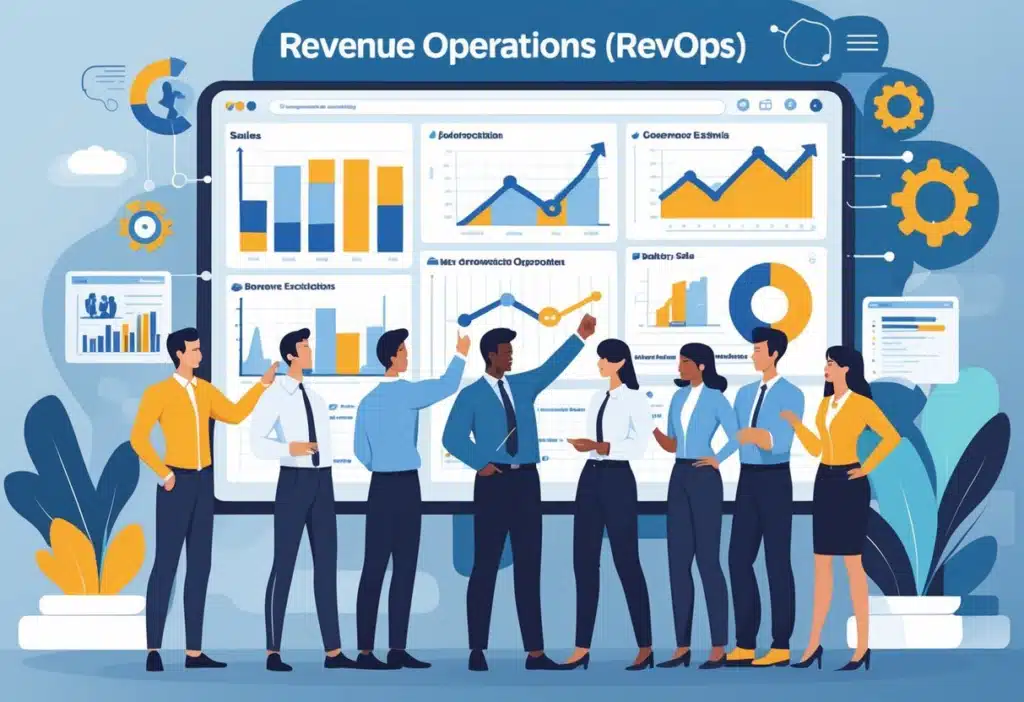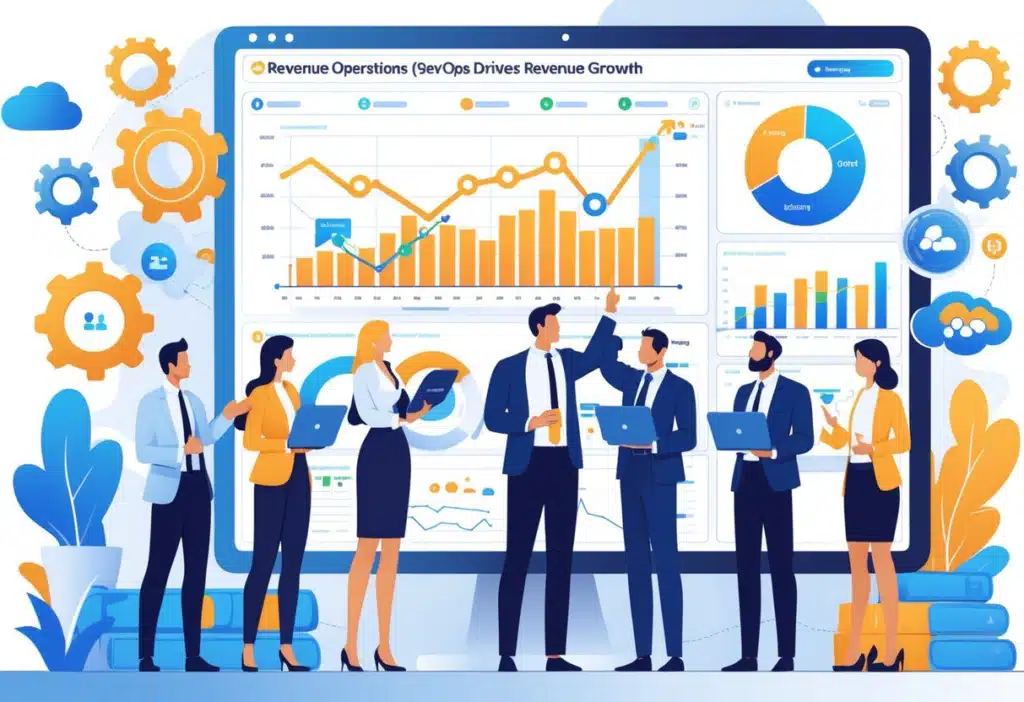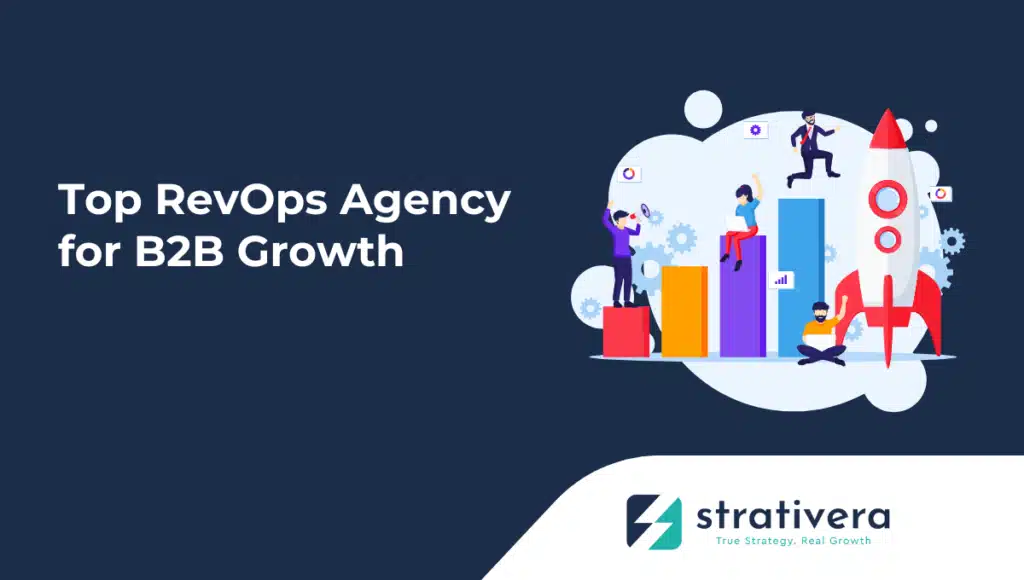Table of Contents
Revenue operations has become crucial for businesses chasing sustainable growth. Yet, lots of companies just can’t seem to get their sales, marketing, and customer success teams on the same page.
A RevOps agency is an outside team of specialists who align sales, marketing, and customer success operations to boost revenue growth using data-driven strategies and streamlined processes. These agencies act as strategic partners, optimizing revenue-generating processes across departments.

Companies are turning to RevOps agencies more often, especially when their own teams just don’t have the broad expertise needed to run things smoothly across all areas. Research shows 21% of companies saw improved alignment and productivity across go-to-market teams after bringing in RevOps functions.
Managing today’s revenue operations can overwhelm founding teams and internal resources quickly. The complexity is just too much sometimes.
It helps to know how RevOps agencies drive growth, roll out tech solutions, and offer flexible service models. That way, businesses can decide whether to build capabilities in-house or bring in outside experts—something that depends a lot on company size, growth stage, and how tangled up their revenue-generating departments are.
What Is a RevOps Agency?

A RevOps agency specializes in aligning marketing, sales, and customer success operations by optimizing processes and integrating technology. Unlike typical consultants, these folks don’t just give advice—they actually roll up their sleeves and implement solutions.
RevOps Agency vs. Revenue Operations Agency
“RevOps agency” and “revenue operations agency” really mean the same thing. Both describe teams who streamline go-to-market functions across departments.
Some agencies go with “RevOps” for snappier branding, while others stick to “Revenue Operations” to highlight their strategic chops. It’s just a matter of style.
Whatever the name, the core approach stays the same. They bring marketing, sales, and customer success under unified processes and shared metrics.
People in the industry use both terms interchangeably. If you’re looking for these services, you’ll get the same expertise either way.
Core Functions of a RevOps Agency
RevOps agencies tackle operational alignment problems by focusing on four main pillars: process, technology, data, and people.
Process Optimization
Agencies redesign workflows to get rid of friction between departments. They set up clear handoff procedures and create shared accountability metrics.
Technology Integration
They bring together messy tech stacks and roll out automation. Many specialize in platforms like HubSpot or Salesforce to make systems run smoother.
Data Management
Agencies build solid reporting structures and create a single source of truth for revenue metrics. They clean up existing data and put governance protocols in place.
Team Enablement
RevOps service providers train teams on new processes and help manage change during implementation.
Benefits of Engaging a RevOps Agency
Companies get instant access to expert help without needing to hire a full-time RevOps team. It’s a shortcut to operational improvements.
Faster Implementation
Agencies show up with proven frameworks and can roll out complex changes in 30-90 days, not months.
Cross-Functional Perspective
They bring unified revenue engine alignment to departments that used to work in silos, cutting down on conflicting metrics and reporting headaches.
Scalable Solutions
External providers design systems that grow with you, so you don’t have to keep rebuilding as things scale up.
Cost Efficiency
Hiring a RevOps agency costs less than bringing on multiple specialists, but you still get cross-functional improvements.
How a RevOps Agency Drives Revenue Growth

RevOps agencies help companies grow revenue by getting disconnected teams working toward the same goals. They set up measurable frameworks so results become more predictable instead of all over the place.
Aligning Sales, Marketing, and Customer Success
RevOps agencies break down silos between sales, marketing, and customer success teams. This alignment means less miscommunication and fewer missed revenue opportunities.
The agency sets up unified revenue targets, replacing separate departmental goals. Now, everyone’s rowing in the same direction.
Centralized data platforms give teams a clear view into the customer journey. Everyone can see accurate, up-to-date info to make better decisions.
RevOps agencies establish shared metrics like:
- Lead quality scores
- Customer acquisition costs
- Lifetime value calculations
- Conversion rates by stage
This coordination leads to seamless handoffs between teams. Marketing-qualified leads go straight to sales, no delays or missing info.
Customer success teams get the full prospect history, so they know buyer preferences and pain points right from the start.
Driving Predictable Revenue Growth
RevOps agencies help companies achieve predictable revenue growth by creating repeatable systems. They swap out guesswork for measurable, scalable methods.
Real-time analytics dashboards track performance across all revenue-generating activities. Teams spot trends and tweak strategies before things go sideways.
Key performance indicators get standardized, like:
- Monthly recurring revenue growth
- Sales cycle length
- Deal win rates
- Customer retention percentages
Agencies build forecasting models using historical data and current pipeline metrics. This gives accurate revenue projections for planning and resource allocation.
They keep optimizing so strategies stay fresh as markets shift. Teams rely on data-driven tweaks, not hunches or outdated habits.
Process Standardization and Optimization
RevOps agencies standardize sales processes so everyone’s on the same page. They document what works, so new hires can hit the ground running.
Automated workflows take over manual tasks that slow things down. Lead scoring, email sequences, and follow-up reminders all run in the background.
Standard operating procedures cover things like:
- Lead qualification criteria
- Proposal creation steps
- Contract approval workflows
- Onboarding sequences
Process optimization finds and fixes bottlenecks that block faster deal closures. Agencies dig into conversion rates between pipeline stages to spot where things get stuck.
Technology integration connects systems that used to be isolated. CRM platforms sync up with marketing automation tools and customer success software, making data flow smoothly.
They review processes regularly to keep things working as the business grows. Agencies tweak workflows before growth causes headaches or slows things down.
RevOps as a Service: Flexible Solutions for Modern Teams
RevOps as a Service bundles expert revenue operations capabilities into flexible, outsourced models. Companies get specialized teams and automation know-how, but don’t have to commit to full-time hires.
Scalability and On-Demand Expertise
RevOps as a Service offers scalable solutions that flex with your needs. You can tap into teams of analysts, system architects, and strategists through flexible setups.
On-demand RevOps teams move fast without the hassle of hiring full-time. They bring specialized skills for launching RevOps from scratch, supporting solo operators, or boosting existing teams during high-growth times.
Key benefits include:
- Cost efficiency: Month-to-month contracts can save up to 60% compared to full-time hires
- Immediate access: Expert teams can start within 72 hours for urgent projects
- Specialized skills: Get automation pros, data architects, and implementation specialists right away
- Flexible scaling: Teams grow or shrink as project needs change
The service model skips recruitment delays and onboarding costs. Companies get instant access to proven methods and automation tools without locking into long-term deals.
When to Choose RevOps as a Service
RevOps as a Service works best for companies that don’t have the internal bandwidth or expertise to build unified revenue systems on their own. It’s a good fit for businesses at certain growth stages or facing specific operational hurdles.
Ideal scenarios include:
- Early-stage companies building scalable systems from scratch
- Growing businesses needing automation across marketing and sales
- Organizations that need help with complex integrations
- Companies experiencing rapid growth and needing RevOps support ASAP
The service is especially handy when internal teams don’t have the technical chops for CRM setups, data architecture, or automation. Companies get the most out of it when they need both big-picture strategy and hands-on execution.
RevOps isn’t a one-size-fits-all thing. Some teams need advanced data architecture, others want lifecycle reporting or funnel optimization. Service providers tailor solutions to the company’s needs and growth stage.
Technology and Tools Implemented by RevOps Agencies
RevOps agencies roll out technology solutions that connect CRM platforms, marketing automation, and sales enablement tools. These setups create unified data flows across teams and automate critical revenue processes.
CRM Implementation and Optimization
A RevOps tech stack usually centers on CRM software for managing customer relationships and deal pipelines. Agencies often set up Salesforce, HubSpot CRM, or Zoho CRM, depending on company size and needs.
They handle data migration, custom field creation, and pipeline configuration. Agencies set up workflows that trigger automatically based on customer actions or deal stage changes.
Key CRM optimization areas:
- Lead scoring models that align marketing and sales
- Custom dashboards for revenue forecasting
- Integration with automation and customer success platforms
- User permissions and data governance policies
Agencies make sure CRM systems become the single source of truth for customer data. They set up two-way data syncs between CRM and other tools to kill off data silos.
For optimization, agencies focus on getting teams to actually use the CRM. They provide training, document processes, and watch usage metrics to tweak things for better productivity.
HubSpot Onboarding Services
HubSpot onboarding is a big deal for RevOps agencies, especially when they work with mid-market and enterprise clients. The platform pulls together CRM, marketing automation, and customer service tools into one place.
Agencies usually kick things off with discovery sessions to figure out current processes and data needs. They’ll map out workflows in detail, check what HubSpot can handle natively, and spot any gaps where outside tools need to plug in.
HubSpot onboarding typically includes:
| Phase | Activities | Timeline |
|---|---|---|
| Discovery | Process mapping, data audit | Week 1-2 |
| Configuration | Portal setup, custom properties | Week 3-4 |
| Integration | Connect external tools, data sync | Week 5-6 |
| Training | User training, documentation | Week 7-8 |
The onboarding process aims to get marketing and sales on the same page by setting shared lead definitions and clear handoff rules. Agencies also set up HubSpot’s attribution reporting so clients can track revenue impact across every touchpoint.
They’ll build automated nurture sequences and set up deal stage automation that actually updates records when prospects take action. User training and standard operating procedures come at the end, once everything’s in place.
Sales Enablement Tools
Sales enablement tools boost productivity and deal speed by making content management and engagement tracking easier. RevOps agencies roll out platforms like Outreach, Salesloft, or Groove to help teams manage outreach sequences and follow-ups.
These tools plug right into CRM systems and log every prospect interaction automatically. Sales teams can build personalized email sequences that trigger based on things like prospect behavior or changes in deal stage.
Core sales enablement features include:
- Email sequence automation and A/B testing
- Call logging and conversation recording
- Content management and sharing analytics
- Activity reporting and performance metrics
Agencies set up these tools to fit the client’s sales process and methodology. They’ll create templates, sequences, and playbooks that match what’s worked before.
They train sales teams on how to build sequences and engage prospects. Agencies also track metrics to see if the tools are actually making a difference in sales performance.
When integrated with revenue intelligence platforms, these tools give more insight into conversation quality and deal risks. Sales managers can use this data to coach their teams better, which honestly makes a difference.
Data-Driven Strategies for Revenue Operations
Revenue operations teams lean heavily on analytics to spot pipeline bottlenecks, forecast outcomes, and keep tabs on performance metrics across sales, marketing, and customer success.
Harnessing Analytics for Revenue Insights
Revenue operations consultants use data to find conversion patterns and improve the whole customer journey. Analytics platforms track lead behavior, deal progress, and customer lifetime value at every touchpoint.
Teams dig into funnel metrics to see where prospects drop off. They look at conversion rates between stages, average deal sizes, and how long deals take to close. This info highlights which marketing channels actually bring in the best leads.
Key Performance Indicators include:
- Lead-to-opportunity conversion rates
- Sales velocity metrics
- Customer acquisition costs
- Pipeline coverage ratios
Advanced analytics tools connect with CRM systems to show real-time dashboards. Revenue teams can break down data by product, region, or customer type. That kind of detail helps spot growth opportunities and decide where to put resources.
Attribution modeling ties marketing activities to closed deals. Multi-touch attribution shows which campaigns really influence buyers. Sales teams can finally see which content and interactions actually move deals forward.
Customizing Data Models for Business Needs
Data-driven revenue operations strategies need data models tailored to each business’s goals and go-to-market approach. Companies design their data architecture to fit unique sales processes and customer segments.
Custom lead scoring models weigh demographic and behavioral factors based on what the company cares about most. For example, B2B companies might care more about company size and industry, while SaaS businesses zero in on product usage and engagement.
Pipeline stage definitions match real sales processes, not just generic templates. Teams create custom fields to capture industry-specific info. Integration mappings keep data flowing smoothly between marketing automation and CRM systems.
Essential data model components:
- Custom object relationships
- Field mapping protocols
- Data validation rules
- Automated workflow triggers
Segmentation models group prospects and customers by how they buy. These segments guide more personalized nurture campaigns and sales tactics. Revenue teams set up data governance policies to keep things accurate and consistent everywhere.
Forecasting and Reporting
Automation makes forecasting easier by pulling data from all over into one dashboard. Revenue teams build predictive models using old performance data, seasonal trends, and current pipeline health.
Rolling forecasts update weekly or monthly as the pipeline changes. Machine learning algorithms flag patterns in deal progression and probability scores. Sales managers can adjust their forecasts depending on how the team’s doing and what’s happening in the market.
Automated reporting includes:
| Report Type | Frequency | Key Metrics |
|---|---|---|
| Pipeline Health | Weekly | Coverage ratios, velocity trends |
| Revenue Performance | Monthly | Attainment rates, growth metrics |
| Lead Generation | Daily | Volume, quality, source attribution |
Executive dashboards pull together revenue performance from every department. Automated alerts go out when metrics drop below certain levels. Teams can drill into specific time frames, territories, or product lines for a closer look.
Revenue operations teams set reporting schedules that line up with business planning cycles. They put together templates for board decks and investor updates. Keeping the format consistent helps stakeholders quickly understand the numbers and make decisions.
Choosing the Right RevOps Agency for Your Business
Finding the right revenue operations partner means weighing factors like technical skills, service offerings, and knowing which agencies actually shine at different parts of the revenue process.
Key Considerations and Selection Criteria
Companies should look at agencies’ technical expertise and their track record with implementations. Most businesses need partners with Salesforce and HubSpot certifications since these platforms are the backbone for many revenue teams.
Contract flexibility really matters. Agencies that offer month-to-month deals are way less risky than long-term contracts, especially if you’re new to RevOps partnerships.
Essential evaluation criteria include:
- Platform certifications – HubSpot Elite or Salesforce partnership status
- Implementation volume – 50+ successful deployments shows real experience
- Team structure – Dedicated specialists vs. generalist consultants
- Pricing model – Fixed project fees vs. fractional team arrangements
- Geographic coverage – Local presence or global service capability
Sales enablement chops should factor into your decision. Agencies that mix RevOps with training and process optimization bring more value than those who just handle the tech side.
The agency’s methodology also carries a lot of weight. A four-phase approach—assessment, strategy, delivery, enablement—usually gets better results than just winging it with one-off consulting.
Top RevOps Agency Examples (Including Strativera)
Strativera — a leading RevOps and Growth Consulting agency — helps B2B and PE-backed companies scale with clarity and precision. With deep expertise in RevOps system design, CRM and platform integration, and revenue attribution analytics, Strativera delivers unified, data-driven strategies that align marketing, sales, and operations to maximize ROI.
Strativera’s four-phase Diagnose → Design → Execute → Optimize methodology ensures every engagement drives measurable growth, scalable systems, and operational visibility across the full customer lifecycle. Our team has supported over $100M in client growth across SaaS, manufacturing, healthcare, and professional services.
Other reputable agencies you may see in the market include:
• TripleDart — full-stack RevOps with 60+ implementations
• Think RevOps — complex Salesforce/HubSpot integrations using a 4-phase methodology
• Revenue Wizards — cost-optimization focus (often positioned as 60% savings vs. FTEs)
• Winning by Design — SaaS-only; heavy sales enablement and training emphasis
• Six & Flow — Go-to-Market specialists; HubSpot Elite Partner
Quick comparison (at a glance):
| Agency | Specialization | Key Strength |
|---|---|---|
| Strativera | Growth, & Platform Optimization | Data-driven systems, automation, and revenue alignment |
| TripleDart | Full-stack RevOps | Implementation volume |
| Think RevOps | Complex integrations | Methodology |
| Revenue Wizards | Cost optimization | Budget efficiency |
FAQs – RevOps Agency
RevOps agencies offer strategic alignment services that help optimize revenue processes across sales, marketing, and customer success. Business leaders usually want to know about service options, pricing, automation benefits, and the specialized roles that make it all work.
What services do RevOps agencies typically offer?
RevOps agencies bring sales, marketing, and customer success teams together to create unified processes for driving revenue. They focus on breaking down silos and building real communication between teams.
Data integration and analytics are at the core of what agencies do. Teams implement centralized reporting to give everyone a single source of truth for revenue data and performance metrics.
Process optimization covers workflow standardization and automation. Agencies rework manual processes to remove bottlenecks and boost efficiency across departments.
Tech stack management means optimizing CRM systems and integrating tools. Agencies make sure all your business tools work well together and train your teams so they can actually use them.
Strategic planning services include revenue forecasting and building growth roadmaps. Agencies set up frameworks that help businesses grow without causing chaos behind the scenes.
How can outsourcing to a RevOps agency improve my business operations?
External agencies offer specialized skills that internal teams might not have. They give you access to seasoned pros who know industry best practices and the latest operational strategies.
Cost efficiency comes from fractional service models, cutting out the expense of hiring full-time. Companies get expert help without the overhead of a big internal team.
Agencies move fast on complex system integrations. Their experience and processes mean projects wrap up much quicker than if you tried to do everything in-house.
Outside teams bring fresh eyes and unbiased assessments. They spot inefficiencies and opportunities for growth that insiders might miss.
Scalability is a big plus. Agencies let you scale services up or down as your business changes, so you’re not stuck with more than you need.
What criteria should I use to evaluate the effectiveness of a RevOps agency?
Revenue growth metrics really matter when you’re sizing up an agency’s performance. Track how many qualified leads come in, how conversion rates shift, and whether your revenue actually climbs after you start working together.
Process efficiency improvements show whether things are running smoother. Look for shorter sales cycles, faster lead responses, and better collaboration between departments.
When data quality gets better, it means the agency is integrating systems well. Check if your reports are more accurate, data is consistent, and dashboards are easier to use.
Team productivity gains say a lot about process changes and training. Are individuals performing better? Is your team spending less time on admin work?
Client retention and satisfaction scores can reveal a lot about long-term value. Successful agencies maintain strong relationships with clients who keep growing over time.
What are the common pricing models for RevOps agency engagements?
Retainer-based pricing gives you steady monthly services for a set fee. If you need ongoing support and strategy across departments, this model fits.
Project-based pricing works for specific jobs or big system changes. You pay a fixed price for things like a CRM migration or a process overhaul.
Performance-based pricing connects what you pay to actual results. Agencies earn through revenue sharing or hitting certain milestones—so their goals match yours.
Fractional service pricing lets you tap into expertise part-time. RevOps as a Service models give you expert help without the cost of a full-time hire.
Hybrid pricing mixes these models to fit what you need. Agencies might combine a retainer with project fees to cover all the bases.
How does RevOps automation contribute to the efficiency of business processes?
Automated lead routing gets prospects to sales reps fast, skipping manual delays. The system matches leads to the right people based on set rules and who’s available.
Data synchronization automation keeps everything in line across your tools. Info moves smoothly between your CRM, marketing platforms, and customer success tools—no manual updates needed.
Workflow automation takes care of repetitive stuff like follow-ups or proposal drafts. That frees up your team to focus on work that actually matters.
Reporting automation gives you real-time insights without the headache of pulling data yourself. Stakeholders can check updated dashboards and metrics whenever they need to make a call.
Customer journey automation makes sure every touchpoint feels consistent. Prospects and customers get the right messages and next steps at just the right times.
What are the typical roles and salaries within a RevOps agency?
RevOps Analysts dive into data analysis and reporting. Their salaries usually range from $55,000 to $85,000 a year.
They spend a lot of time interpreting metrics and building dashboards. Tracking performance across revenue teams is a big part of what they do.
RevOps Managers take charge of process implementation and client relationships. You’ll often see them earning between $80,000 and $120,000 per year.
They coordinate projects across different teams. Making sure everything gets delivered on time? That’s on their plate too.
Senior RevOps Consultants bring strategic advice and system design skills to the table. These folks typically earn somewhere between $100,000 and $150,000 annually.
They lead tough implementations and come up with custom solutions for clients who need something a bit out of the ordinary.
RevOps Directors run agency operations and manage client portfolios. Their paychecks usually land in the $130,000 to $180,000 range each year.
They look after several client relationships at once and steer the agency’s overall strategy. It’s a lot to juggle, honestly.
Technical specialists—think automation pros and CRM architects—often pull in between $90,000 and $140,000. These roles demand serious expertise in certain platforms and integration tech.

